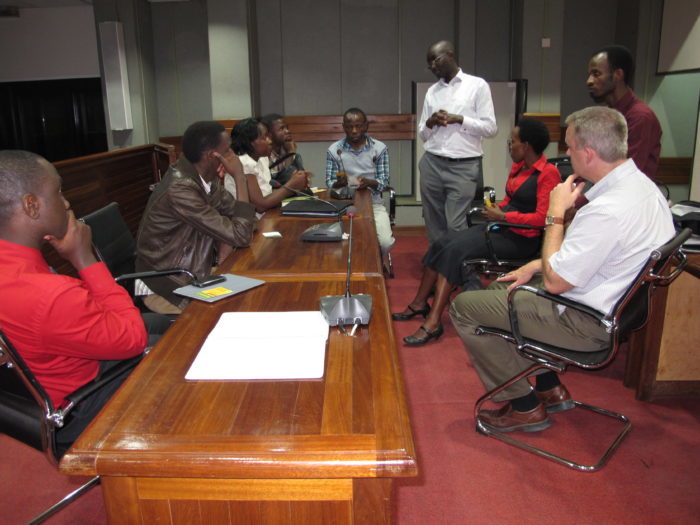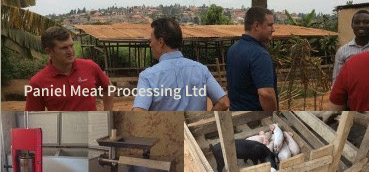This article is about with our long-standing friend, ambassador, distance consultant, and visiting executive, Darrell Frick, about his experiences while being involved with RCE.
It all started in 2012, when we first encountered Darrell, a Chick-fil-A Owner/Operator out of Elkridge, California, through our kingdom business partnership with LifeShape International. He was able to join a cross-country trip in 2012 with a colleague, and found himself at BDC Rwanda as a Visiting Executive (VE). From the get go, he felt connected to a number of the BDC graduates he encountered, who openly and willingly shared their stories and experiences from the Rwandan genocide with such rawness and courage. These people whose lives and families were wrecked by death and destruction were embodying principles of grace and forgiveness; redemption and renewed conviction.
The Power of Prayerful Provision – Yet Darrell and his colleagues didn’t just get to hear their stories and give them business advice, they were able to become active participants in their journey. Around the table, they prayed for these aspiring entrepreneurs, many of whom, had never experienced an intercession on their behalf or a time of communal prayer. One graduate even later shared with them:
“It’s meant so much to me that you would take your time to come here. And then to pray with me? You’ve lifted my depression to hope, and I’ve never experienced that element of faith before. It’s truly meant so much to me, I’m going to name my son after you.”
Staying Connected
Back at Home- Upon returning from his trip, Darrell’s desire to stay connected remained fueled. The Lord led him to RCE’s Distance Consulting program. Darrell admits:
“Honestly, at first I felt overwhelmed and inadequate for the level of business experience need. Yet I still chose to step out in faith as a Distance Consultant (DC), and started making the calls to Herve [an entrepreneur I’d met in Rwanda and was connected to]. I approached the conversations with a simple coaching framework. By asking questions, and walking him through current hot topics, it gave Herve the ability to clarify what was going on in his business, what was a priority, and simply gave him a grateful heart for someone who was also invested in his interests.”
Darrell goes on to tell us that, “Culturally, the availability of mentorship is largely lacking in Rwanda (as a result of the genocide), so even hearing, ‘Good job’, is so meaningful. What also transpired from the calls, were unique opportunities for me to serve as a professional reference and advocate for Herve in his future endeavors.”
When asked what he’d say to someone considering getting involved with the DC &/orVE opportunity he stated:
“Make connections and check in with people—the kingdom impact you can have in talking to someone for 1 hour is pretty amazing” – Darrell Frick
How Did They Make It Work?
Read more about how Darrell and Herve pushed through the challenges and obstacles associated with distance communication, as well as his secrets for lasting connection and success in next month’s newsletter.
We are grateful for and encouraged by all of Darrell’s investments and contributions.
Where Were We? – Last month, we left off talking about the experiences of Darrell Frick, RCE ambassador, distance consultant, and visiting executive to BDC Rwanda. If you missed Part 1, you can catch up and check it out here.
As anyone can imagine, there are often challenges associated with trying to communicate cross-continentally and cross-culturally. In order to push past these barriers and physical limitations, Darrell and Rwandan entrepreneur, Herve, primarily made use of Skype, Whats App, and email for their correspondence.
Darrell and Herve’s sessions were simple in format, but powerful in production. They walked through open-ended, reflective questions such as:
- What was your greatest challenge this week?
- What was your greatest success?
- What is a hot topic you’d like to walk through?
This format kept the calls focused, while enabling authentic dialogue. By empowering Herve to think, reflect, and make recommendations for himself; the learning continued long past the classroom setting for both parties. Having someone to bounce ideas and situations off of in confidence, can make all the difference between pushing forward into growth and settling in familiarity.
Why Distance is Still Rewarding – After having the physical experience of interacting in Rwanda, Darrell tells us consulting at a distance remained rewarding because:
- “Thanks to technology, it broke down borders and fulfilled the desire to be impactful in Rwanda, while still being in the US.”
- “Then, when I’ve been able to get back in country (1-2x/year), we don’t have to start where we left off. We’re already in motion. It makes each of my travel experiences that much more rich and worthwhile for the time and resources invested to do so.”
- “By continuing to grow in relationship with the connections I’d made, I’ve been able to plan out my team’s time there. That way I could really be intentional and best utilize their skills, talents, and gifts. By sharing this with our hosts in advance, it would really set us up for a productive visit.”
Lessons & Best Practices, As Shared:
We’ll also be applying some of Darrell’s wise recommendations and best practices for our program(s) by:
Giving a few hours of your time and attention can truly propel a nation into advancement.



